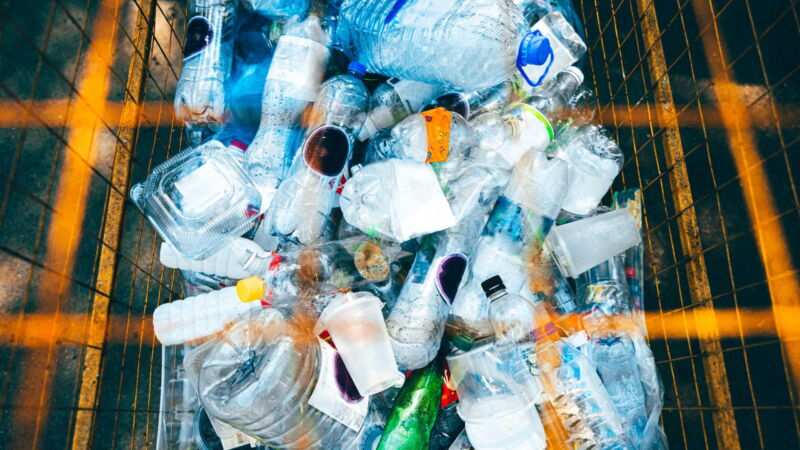
Olga Pankova/Moment via Getty Images
This story was originally published by ProPublica, a Pulitzer Prize-winning investigative newsroom. Sign up for The Big Story newsletter to receive stories like this one in your inbox.
Most of the products in the typical kitchen use plastics that are virtually impossible to recycle.
The film that acts as a lid on Dole Sunshine fruit bowls, the rings securing jars of McCormick dried herbs, the straws attached to Juicy Juice boxes, the bags that hold Cheez-Its and Cheerios—they’re all destined for the dumpster.
Now a trade group representing those brands and hundreds more is pressuring regulators to make plastic appear more environmentally friendly, a proposal experts say could worsen a crisis that is flooding the planet and our bodies with the toxic material.
The Consumer Brands Association believes companies should be able to stamp “recyclable” on products that are technically “capable” of being recycled, even if they’re all but guaranteed to end up in a landfill. As ProPublica previously reported, the group argued for a looser definition of “recyclable” in written comments to the Federal Trade Commission as the agency revises the Green Guides—guidelines for advertising products with sustainable attributes.
The association’s board of directors includes officials from some of the world’s richest companies, such as PepsiCo, Procter & Gamble, Coca-Cola, Land O’Lakes, Keurig Dr Pepper, Hormel Foods Corporation, Molson Coors Beverage Company, Campbell Soup, Kellanova, Mondelez International, Conagra Brands, J.M. Smucker, and Clorox.
Some of the companies own brands that project health, wellness, and sustainability. That includes General Mills, owner of Annie’s macaroni and cheese; The Honest Co., whose soaps and baby wipes line the shelves at Whole Foods; and Colgate-Palmolive, which owns the natural deodorant Tom’s of Maine.
ProPublica contacted the 51 companies on the association’s board of directors to ask if they agreed with the trade group’s definition of “recyclable.” Most did not respond. None said they disagreed with the definition. Nine companies referred ProPublica back to the association.
“The makers of America’s household brands are committed to creating a more circular economy which is why the industry has set sustainability goals and invested in consumer education tools” with “detailed recycling instructions,” Joseph Aquilina, the association’s vice president and deputy general counsel, wrote in an email.
The Green Guides are meant to increase consumer trust in sustainable products. Though these guidelines are not laws, they serve as a national reference for companies and other government agencies for how to define terms like “compostable,” “nontoxic” and “recyclable.” The Federal Trade Commission is revising the guides for the first time since 2012.
Most of the plastic we encounter is functionally not recyclable. It’s too expensive or technically difficult to deal with the health risks posed by the dyes and flame retardants found in many products. Collecting, sorting, storing and shipping the plastic for reprocessing often costs much more than plowing it into a landfill. Though some newer technologies have pushed the boundaries of what’s possible, these plastic-recycling techniques are inefficient and exist in such limited quantities that experts say they can’t be relied upon. The reality is: Only 5 percent of Americans’ discarded plastic gets recycled. And while soda bottles and milk jugs can be turned into new products, other common forms of plastic, like flimsy candy wrappers and chip bags, are destined for trash heaps and oceans, where they can linger for centuries without breaking down.
The current Green Guides allow companies to label products and packaging as “recyclable” if at least 60 percent of Americans have access to facilities that will take the material. As written, the guidelines don’t specify whether it’s enough for the facilities to simply collect and sort the items or if there needs to be a reasonable expectation that the material will be made into something new.